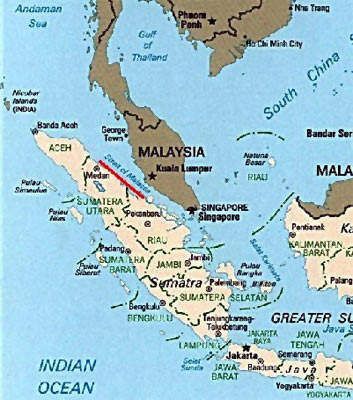
In April 2007 it was reported that Malaysia had developed a plan to build two refineries and a 320km pipeline in the north of the country in order to have a more integrated petroleum refining policy and to increase security by being able to bypass the Malacca Straits on the country’s western coast where there is a risk of attack by pirates. The project is estimated to be worth more than $14bn.
The two refineries will be built in the northern provinces of Kedah and Kelantan with a 320km pipeline connecting the two. Malaysia as a Muslim country has been courting links with the oil-rich state of Iran and the National Iranian Oil Company (NIOC) has been offered a minority stake in the $2.2bn Kedah refinery being developed by SKS Development a subsidiary of SKS Ventures (who have just landed a $16bn (€12bn) gas-development deal with Tehran to develop two gas fields in southern Iran).
SKS Development wanted NIOC as a partner. An increase in energy deals between these Muslim countries is worrying the US. The project received government clearance in 2006. The refined products will be for the Japanese, Chinese and South Korean markets.
Kedah refinery infrastructure
The new Kedah refinery will be able to process in excess of 200,000 barrels per day (bpd) and it will process Iranian crude oil. The north-western region is also host to a second refinery project of the same size. Some analysts believe that an over capacity in the global downstream investment may send the cyclical industry into another profit slump by 2010.
Deputy Prime Minister of Malaysia Najib Razak said: “A massive Malaysian oil pipeline project to process and pump oil shipped from the mid-east could lower transportation costs and avoid risks of pirate attacks on tankers at the Malacca Strait… It’s primarily for commercial purposes because they think they can transport the oil at a lower cost.”
Contractors
Malaysian firms Merapoh Resources Corp and SKS Ventures will build the refineries, while Trans-Peninsula Petroleum will construct the pipeline, Kedah officials have said. A report has warned that laying the pipes could be an ‘arduous and challenging feat’ as environmental and land issues would need to be addressed.
In May 2008, developer TRANS-Peninsula Petroleum Sdn Bhd (TPP) said it may sell shares on the stock exchange to fund the project, which is expected to span seven years. The pipeline is estimated to cost $7 billion – phase one of which will be 2.3$ billion to create.
TPP has said it will seek government investment into the project. Its project partners to date are: Ranhill Bhd – for the construction work –and Indonesia’s PT Tripatra Engineers & Consultants (project managers). PT Bakrie & Brothers Tbk will supply the steel pipes and Al-Banader International Group of Saudi Arabia will help secure oil supplies.
The pipeline will help get oil from the Middle East to East Asian consumer and will eventually play an important part in oil distribution in the region. The project will include offshore mooring facilities to accommodate deep-draght tankers, with day tanks situated in Yan and Bachok. Storage facilities will be built in Jeli and Kelantan along the pipeline along with a major storage system that can hold 90 percent of the system’s capacity.
Refinery finance
SKS Development is linked to the Malaysian tycoon Syed Mokhtar Al-Bukhary and the plans are to start building the coastal refinery in July 2007, which will be operational by 2010.
Over 70% of the finance will be of a foreign origin (Aseambankers research report) with investors from China, Iran and Saudi Arabia each taking a stake in the facility. The 50bn ringgit ($14.2bn; €10.6bn) project will involve building a 320km (200-mile) pipeline across northern Malaysia, linking ports on the two coasts.
Project consequences
The project will allow oil shipped from the Middle East to bypass the Malacca Strait shipping lanes on the Malaysian western coast. But this will be bad news for Singaporean business, since the Strait of Malacca will not be used as frequently when the project is completed and no more ships will need to make a stop in Singapore harbour.
Most of the oil tanks will go straight from the Middle East to Kedah port, transferring the oils to be processed there and the refined products will then be sent through huge pipelines to Kelantan for exportation.
The Malacca Straits is one of the world’s busiest shipping routes which currently carries half the world’s oil shipments and more than a third of its commerce. The Strait is shared by Malaysia, Indonesia and Singapore. It is notorious for robberies and kidnappings by pirates, but attacks have fallen following increased security patrols since 2005. This project will allow Middle East oil shipments to reach the South China Sea without travelling through the Malacca Strait.



